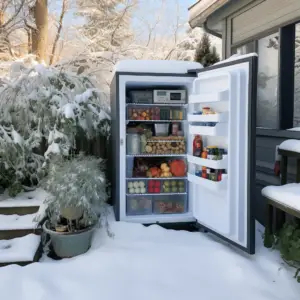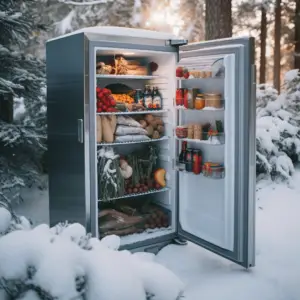Fridge Outside in Winter, When setting up a fridge at home, most people tend to ignore temperature-related concerns. This is especially true, given that most fridges are meant to be set in the kitchen. But does your fridge need to be limited to inside the house? What if you’re thinking about leaving it outside in the winter?
Well, for extra storage, or easy access to outdoor cold beverages while camping, you can run a fridge outside. You’ll most likely end up using more energy than if the fridge were inside, but on the bright side, you’ll get to practice some efficiency.
Table of Contents
Can A Refrigerator Be Stored Outside In The Winter Unplugged?

It is not advisable to leave your fridge outside in the winter unplugged. This can cause issues with major internal components like compressors. Besides, the average fridge is developed and meant to remain set at room temperature to serve properly. So if you’re planning to store a fridge outdoors, be sure to have it fully packaged and protected for warmth.
Therefore, the question of whether you should leave your fridge outside is a complex matter. It often depends on a number of factors including; the age of the fridge, time left outdoors, and external temperatures. You’ll basically need to focus on the temperature and where you’re setting the fridge.
There are several issues that are likely to pop up if you choose to leave a fridge outside for long periods. This guide will explain what some of those problems are in regard to the question “can a refrigerator be stored outside in the winter unplugged?”
Cases against Leaving Your Fridge Outside
Damages Compressor
One main issue definitely has to do with the compressor. A fridge is heavily reliant on the compressor to keep running and function properly. That means if the compressor has been set outside in the cold, then most likely the damage will occur. It can also reach a point where this part of the fridge stops working even when plugged in.
Simply put, you can leave you’re your fridge outside, but you’ll be running a huge risk; the compressor may end up performing badly or not working at all.
It is recommended to keep it at room temperature throughout the year. Just because you have unplugged it doesn’t mean it’s safe to leave a fridge outside for too long. Otherwise, the compressor will more than likely give out and call for a replacement.
The Fridge May Stop Cooling Once Plugged In
If you’re still wondering if you can store your fridge outside unplugged, you need to focus on the cooling. Note that a fridge is only useful if it’s cooling items.
Unfortunately, your fridge may not work as intended when you bring it back in after leaving it outside. This is because the cooling components will lose their edge with a great proportion.
Reduced Power Output
It is easy to think about cooling when deciding whether to leave your fridge outside unplugged, but that’s not the only issue. Likewise, you’ll have to consider the amount of power that is used by the fridge.
Fridge Outside in Winter the components on board aren’t in the right condition, you’ll hardly get the output you’re looking for. Note that this can hold you back in the long run.
Basically, the internal components will stop optimizing for power, which might cause the overall power output to drop by 50% and maybe more. The fact that the components won’t be in use all the time means that they won’t handle the surge of power well. This in turn means that your fridge isn’t going to function as you would expect.
The Differences Between Indoor Refrigerators and Outdoor Refrigerators

While having a second refrigerator is a dream come true for most homeowners, those with large families, and those who like to buy in bulk might benefit from the convenience of an outdoor fridge. This way, you’ll get to have food and beverages nearby while enjoying the great outdoors.
Although the science behind refrigeration remains the same, the difference in humidity and temperature between outdoor and indoor environments brings about the need for adjustments in materials and engineering. These include:
Construction
An average refrigerator is developed to operate in conditions ranging from 55 to 80 degrees and tends to lose its effectiveness outside these parameters.
An outdoor unit, on the other hand, is heavily insulated to subside the impact of temperature fluctuations and safeguard the contents while lessening the strain on the system components such as the motor and compressor.
Flexibility
Generally, outdoor refrigerators are designed to function at a much wider range of ambient temperatures in comparison to indoor models. As such, a refrigerator that is developed for outdoor purposes will also function well indoors.
Finish
Constant exposure to elements can cause an average refrigerator to rust, considering that they’re basically meant for indoor purposes. On the other hand, outdoor models are constructed from materials tough to rusts such as grade 304 stainless steel.
Price
As you would expect, outdoor refrigerators often cost more and are associated with greater functionality in comparison to indoor refrigerators.
The Bottom Line
Overall, to answer the question “can a refrigerator be stored outside in the winter unplugged?” it is never a good idea to leave your outside in the winter. This will only do more harm than good including ruining the fridge’s components. So always keep it at room temperature.


